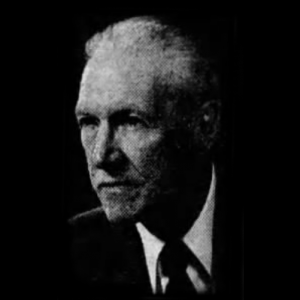
(June 21, 1910-Dec. 12, 1996). An Indianapolis native, Fillenwarth was the third of eight children of Henry James Fillenwarth, a worker with the . He grew up on English Avenue and attended Cathedral High School, , and Indiana Law School at Indianapolis. He obtained his license to practice law in 1935 and married the former Helen Keating that same year. The couple had three children, including a son, Edward J. Fillenwarth Jr., who later joined and then succeeded him in his labor law practice. A member of Little Flower Catholic Church on Indianapolis’ east side, Fillenwarth, in 1939, cofounded the Catholic Youth Organization (CYO) and served as the first president of its board of directors.
For more than a decade after his admission to practice law and throughout the 1940s, Fillenwarth maintained a general practice in the Indiana trial and appellate courts. In 1953, after cofounding the firm of Gregg Fillion Fillenwarth & Hughes he opened a practice in the in downtown Indianapolis and soon thereafter began exclusively representing labor unions.
In the 1950s, Indianapolis was home to the headquarters of several international unions (see ). Fillenwarth was able to take advantage of practicing law in the city while it was a center of this labor union activity. He soon acquired a reputation as a fierce advocate for workers and their unions, particularly the as well as those in the printing trades, building trades, and several AFL-CIO industrial unions. He became well-known by several prominent International Brotherhood of Teamsters officials, including its president Jimmy Hoffa.
In addition to serving as labor counsel to Teamsters Local 135, Fillenwarth represented Local 1 of (ITU), which was the first local union chartered by the ITU in 1852. Its headquarters were located in Indianapolis from 1886 until 1959. He also was an attorney for the Journeymen Barbers International Union, represented unionized barbers and beauticians throughout the United States and Canada. It was headquartered in Indianapolis on West Washington Street in the 1960s and 1970s. He appeared in numerous federal and state courts, as well as before the National Labor Relations Board, fighting for the rights of workers to organize, strike, and bargain collectively with their employers.
In 1963, after his son graduated from Notre Dame Law School, father and son formed the labor law firm known as Fillenwarth & Fillenwarth. By the early 1980s, the firm had greatly expanded its labor union clientele and grown to six lawyers, ultimately becoming known as Fillenwarth Dennerline Groth & Towe and continuing practice in the field of labor relations law on the side of workers.
Fillenwarth retired from the practice of law in 1980.

Help improve this entry
Contribute information, offer corrections, suggest images.
You can also recommend new entries related to this topic.